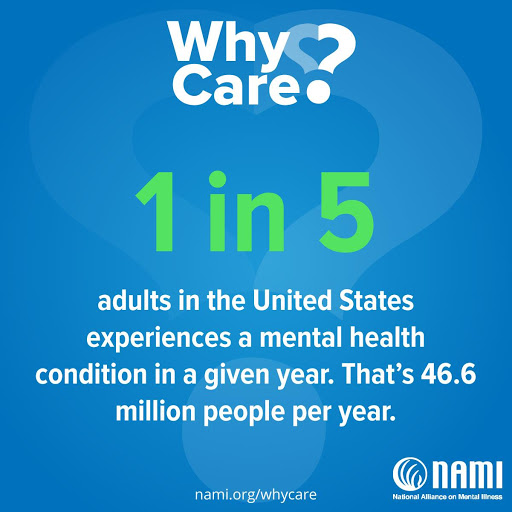Written by Tonayo Crow
Despite the stigma surrounding mental health, there are millions of Americans who experience mental illness (nearly 1 in 5 or about 20% of American adults). Mental illness is tricky to talk about, because there are so many ways to experience a mental health disorder. By mental illness, I am referring to “condition[s] that [affect] a person’s thinking, feeling, or mood,” which include but are not limited to various anxiety disorders, depression, bipolar disorder, post-traumatic stress disorder, obsessive compulsive disorder, and more. And, like any physical illness, mental health does not solely impact the individual; it can impact the people they live, work, and interact with as well. This is especially relevant right now during a global pandemic, when it’s unclear exactly when we’ll be able to return to “normal,” and people are dealing with sickness, job loss, and the stress of staying inside, coupled with caring for children or parents on top of everything else. For those folks already dealing with mental illness, this current situation understandably may exacerbate underlying issues. It is important that we treat mental illness like we would any other illness and provide the support and care that people need to live their healthiest lives. Our mental and emotional wellbeing is equally as important as our physical wellbeing. 
We cannot think about mental health without considering equity. People experiencing homelessness, incarcerated folks, and people struggling with substance use disorders are all at a high risk to have a mental illness. There is also the basic question of who has access to mental health care, physically (e.g. ease of transportation, access to telemedicine, etc.) or fiscally (e.g. having insurance/having insurance that covers mental health care). And towering over all these nuanced issues is the sting of stigma, which may be intensified depending on one’s ethnic or cultural background. If someone is struggling but living in an environment where these illnesses are not considered to be serious, that makes it even more difficult for them to get the care they need.
Furthermore, there is an added complexity when addressing mental health because often mental illness is invisible. Take generalized anxiety disorder, for example. A person with GAD may feel their heart racing, and/or have trouble sleeping, and/or have frequent anxious thoughts. On the outside, however, they may present as “normal,” and no one would ever know. A similar argument could be made for people who are considering or have considered suicide, which is, unfortunately, on the rise as a cause of death in both young people and adults. While there may be warning signs, it is not always clear when someone is deeply struggling. There is simply no way to look at a person and know exactly what they are dealing with, which makes it even more imperative that mental health is prioritized in our health care system and in our communities.
So, what can be done? First and foremost, simply talking more openly about all forms of mental illness helps reduce stigma. This can happen through education in schools, advocacy by community-based organizations and nonprofits, and on a personal level with your friends and family. It is equally important to support legislation that provides for mental health care, like the Affordable Care Act, and to support efforts in your community to expand access to mental health care. The worst thing we can do is ignore this and pretend it is a nonissue. We must take a public health, cross-sector approach to mental health, and support the millions of people across the country who are dealing with these illnesses. On a final note, I urge you all to take it seriously if someone tells you they are struggling with mental illness. It can be scary to talk about, but a lot of times people just really need someone to listen to them and validate what they are feeling. You do not have to be a mental health professional to lend an ear or to support policies that seek to destigmatize mental health and expand services, especially for underserved populations. And if you or someone you know is struggling with mental illness, please know that you are not alone. Through advocacy, education, and conversation, we can help each other take care of our mental wellness.
If you want to learn more or are looking for some help, please refer to this resource list.
